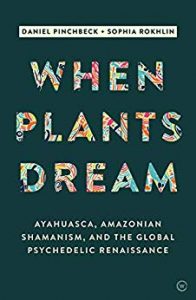 In When Plants Dream, Pinchbeck and Rokhlin explore the economic, social, political, cultural and environmental impact that ayahuasca is having on society. Part 1 covers the background; what ayahuasca is, where it is found, and its cultural origins. Part 2 explores the role and practices of the ayahuasquero in both Amazonian and Western cultures. Part 3 examines the medicinal plants of the Amazon, looking particularly at the ingredients in ayahuasca and their therapeutic qualities, covering the most up-to-date biomedical research, psychedelic science and psychopharmacology. It also covers all the legal aspects of ayahuasca use. Lastly in Part 4 Pinchbeck and Rokhlin question the future of ayahuasca. When Plants Dream is the first book of its kind to look at the science and expanding culture of ayahuasca, from its historical use to its appropriation by the West and the impact it is having on cultures beyond the Amazon.
In When Plants Dream, Pinchbeck and Rokhlin explore the economic, social, political, cultural and environmental impact that ayahuasca is having on society. Part 1 covers the background; what ayahuasca is, where it is found, and its cultural origins. Part 2 explores the role and practices of the ayahuasquero in both Amazonian and Western cultures. Part 3 examines the medicinal plants of the Amazon, looking particularly at the ingredients in ayahuasca and their therapeutic qualities, covering the most up-to-date biomedical research, psychedelic science and psychopharmacology. It also covers all the legal aspects of ayahuasca use. Lastly in Part 4 Pinchbeck and Rokhlin question the future of ayahuasca. When Plants Dream is the first book of its kind to look at the science and expanding culture of ayahuasca, from its historical use to its appropriation by the West and the impact it is having on cultures beyond the Amazon.
Review: ANTIFRAGILE – Things That Gain From Disorder
7 Star Top 1%, Best Practices in Management, Capitalism (Good & Bad), Change & Innovation, Complexity & Resilience, Economics, Environment (Solutions), Intelligence (Public), Nature, Diet, Memetics, Design, Survival & Sustainment, Values, Ethics, Sustainable Evolution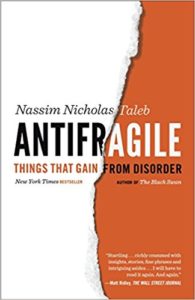
Nassim Nicholas Taleb
7 Star Transformative — As Important as Governing the Commons — LOCALIZE
For those who do not know this, Governing the Commons: The Evolution of Institutions for Collective Action earned Elinor Ostrom a Nobel Peace Prize in Economics. This book, by the author of Black Swan: The Impact of the Highly Improbable is of that caliber. A later book,, Skin in the Game: Hidden Asymmetries in Daily Life is easier to read — if you have time for only one go with the latter.
The core message of this book is that you cannot predict or control high impact low probability events, but you can downsize, localize, you can decentralize, and in so doing make much of the ecology “antifragile.”
Continue reading “Review: ANTIFRAGILE – Things That Gain From Disorder”
Review: Designing Regenerative Cultures
6 Star Top 10%, Atlases & State of the World, Best Practices in Management, Change & Innovation, Complexity & Resilience, Consciousness & Social IQ, Cosmos & Destiny, Culture, Research, Decision-Making & Decision-Support, Economics, Education (Universities), Environment (Solutions), Future, Intelligence (Public), Intelligence (Spiritual), Intelligence (Wealth of Networks), Nature, Diet, Memetics, Design, Priorities, Public Administration, Science & Politics of Science, Stabilization & Reconstruction, Strategy, Survival & Sustainment, Technology (Bio-Mimicry, Clean), True Cost & Toxicity, Values, Ethics, Sustainable Evolution, Water, Energy, Oil, Scarcity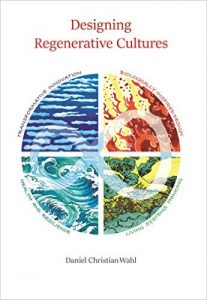
Daniel Christian Wahl
6 Star Handbook for Saving Civilization & Earth
This book makes the jump from 5 stars (generally I don't bother to review a book if it is not a four or five star read) to 6 stars — my top ten percent — because of the combination of Questions Asked, glorious color graphics, and the total holistic nature of the book — this is easily a PhD thesis in holistic analytics, true cost economics, and open source everything engineering. Indeed, this book could be used as a first-year reference across any humanities and science domain, they would be the better for it.
Worth a Look: The Water, Food, Energy, and Climate Nexus
5 Star, Environment (Problems), Environment (Solutions)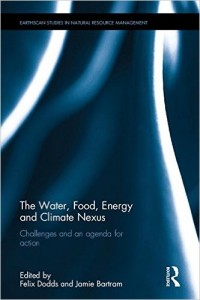
Global trends of population growth, rising living standards and the rapidly increasing urbanized world are increasing the demand on water, food and energy. Added to this is the growing threat of climate change which will have huge impacts on water and food availability. It is increasingly clear that there is no place in an interlinked world for isolated solutions aimed at just one sector. In recent years the “nexus” has emerged as a powerful concept to capture these inter-linkages of resources and is now a key feature of policy-making.
This book is one of the first to provide a broad overview of both the science behind the nexus and the implications for policies and sustainable development. It brings together contributions by leading intergovernmental and governmental officials, industry, scientists and other stakeholder thinkers who are working to develop the approaches to the Nexus of water-food-energy and climate. It represents a major synthesis and state-of-the-art assessment of the Nexus by major players, in light of the adoption by the United Nations of the new Sustainable Development Goals and Targets in 2015.
Continue reading “Worth a Look: The Water, Food, Energy, and Climate Nexus”
Review: Transforming the Dream – Ecologism and the Shaping of an Alternative American Vision
6 Star Top 10%, America (Founders, Current Situation), Banks, Fed, Money, & Concentrated Wealth, Best Practices in Management, Capitalism (Good & Bad), Change & Innovation, Civil Society, Complexity & Resilience, Consciousness & Social IQ, Culture, Research, Democracy, Economics, Education (General), Education (Universities), Environment (Problems), Environment (Solutions), Future, Intelligence (Public), Nature, Diet, Memetics, Design, Peace, Poverty, & Middle Class, Politics, Power (Pathologies & Utilization), Public Administration, Science & Politics of Science, Survival & Sustainment, Values, Ethics, Sustainable Evolution, Voices Lost (Indigenous, Gender, Poor, Marginalized)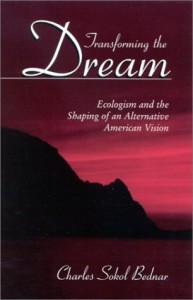
Charles Bednar
5.0 out of 5 stars 6 Star Synthesis, Starting Point for Anyone Who Wishes to Think Holistically, July 4, 2015
The author taught me most of what I retain in the way of political science fundamentals during our time together at Muhlenberg College, where he was former Chair of the Department of Political Science and an Associate Dean. We had not kept in touch since I left Muhlenberg in 1974, but in 2014 I reached out to him and bought this book immediately upon learning of its existence.
Published in 2003 by the State University of New York Press, this book was evidently not marketed at all, and little noted. That is a sad commentary on our times, because I find that the author has distilled multiple literatures into one coherent presentation, augmented by an original model that tells a vital story beyond Ecological Economics into Ecological Political Economy (in essence, politics), into Ecological Ethics and Ecological Pedagogy, two topics rarely covered by others.
Review: Change the Story, Change the Future – A Living Economy for a Living Earth
5 Star, Culture, Research, Economics, Environment (Solutions), Intelligence (Public), Nature, Diet, Memetics, Design, Survival & Sustainment, Values, Ethics, Sustainable Evolution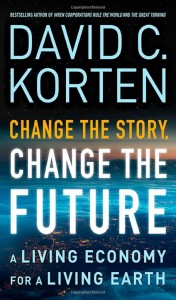
David Korten
5.0 out of 5 stars Brings Us Full Circle — Valuable as Remedial Education for All, June 27, 2015
David Korten has been one of my heroes and indirect mentors through his books for over a decade. His book The Great Turning: From Empire to Earth Community resonated deeply with me, and I completely agree that the premise of that book, to wit, people are the new (restored) super-power actualized through local resilience and global community.
This book takes on great importance as we reflect on the United Nations and its Sustainability Development Goals (SDG), combined with The Most Holy Father agreeing to visit the UN in September to deliver and encyclical that has been leaked, on climate change. This book can be considered the middle book, the book that brings a largely unconscious public, generally poorly read, up to speed with “the new story.” It is not a new story, as one reviewer archly observes, it is in fact the original story harking back to a time when our indigenous ancestors respected the Mother Earth, observed plants and animals as co-equal intelligence, forgot nothing through oral history, and generally acted as stewards of the earth. One of the best books showing before (Mayan, Aztec) and after (guns, germs, steel) is 1491: New Revelations of the Americas Before Columbus.
Continue reading “Review: Change the Story, Change the Future – A Living Economy for a Living Earth”
Review: Digital Humanitarians – How Big Data is Changing the Face of the Humanitarian Response
5 Star, Best Practices in Management, Civil Affairs, Complexity & Resilience, Environment (Solutions), Geography & Mapping, Humanitarian Assistance, Information Operations, Intelligence (Public), Stabilization & Reconstruction, Survival & Sustainment, Values, Ethics, Sustainable Evolution, Voices Lost (Indigenous, Gender, Poor, Marginalized)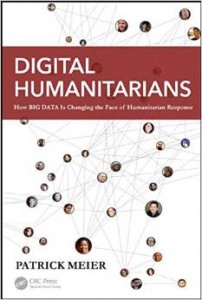
Patrick Meier
5.0 out of 5 stars World-Changing Book Documenting Intersection of Humans, Technology, and Policy-Ethics, February 2, 2015
This is a hugely important work, one that responds to the critical needs outlined by Micah Sifry in The Big Disconnect: Why The Internet Hasn't Transformed Politics (Yet) and others such as myself writing these past 25 years on the need to reform the pathologically dysfunctional US secret intelligence community that is in constant betrayal of the public trust.
Digital Humanitarians are BURYING the secret world. For all the bru-ha-ha over NSA's mass surveillance and the $100 billion a year we spend doing largely technical spying (yet only processing 1% of what we waste money on in collection), there are two huge facts that this book, FOR THE FIRST TIME, documents:

